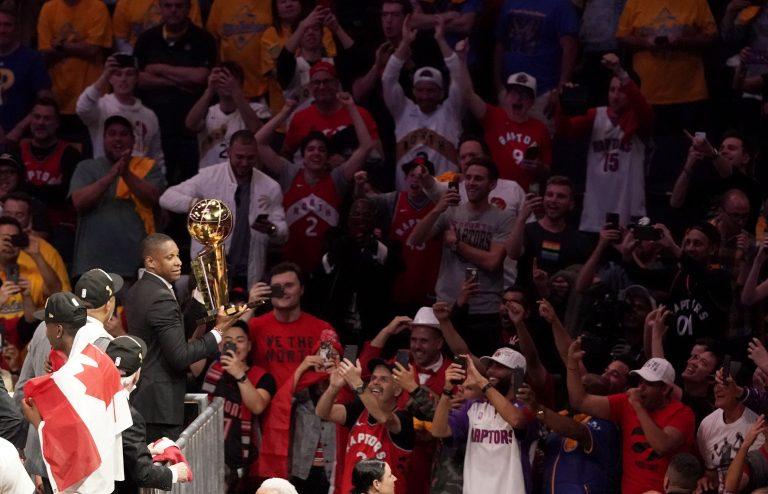The racial profiling of Masai Ujiri
Andray Domise: Police violence, media complicity and how the Toronto Raptors’ proudest moment became another piece of evidence

Ujiri holding the championship trophy after the Raptors defeated the Golden State Warriors on June 13. (Tony Avelar/AP)
Share
A few years ago, after I wrote a column for Maclean’s on the police killing of Jordan Edwards, I informed my editor at the time that I would prefer to not cover the topic when it wasn’t relevant to Canada. Of course, it’s important for news media to document police killings, I said at the time, and it’s the responsibility of the columnist to analyze them. Otherwise, the narrative offered by police (which is too often passed on by a sympathetic media as objective reporting) becomes the lone authoritative voice in the discourse. This skewed reporting can leave readers with the impression that Black people suffer death—as well as brutal assaults, verbal abuse at gunpoint, and everyday racial profiling—as a result of our own careless actions, rather than state-sanctioned enforcement of racial hierarchies.
But there is a mental toll to writing about police violence, and that the source of that toll isn’t just the knowledge that a structurally white supremacist state sees Black life as disposable, if not inconvenient to its project. There’s also the fact that Black writers must revisit this conversation, ad infinitum, and be met with skeptical reactions ranging from feigned shock to outright denial when we provide rafts of evidence that police are not simply affected by “unconscious bias” (which is clever bureaucrat-speak for “everybody’s a little bit racist”), but are active participants in racial conflict.
Take, for example, the carding of Toronto Raptors president Masai Ujiri. After the final moments of game six, when nine milliseconds were stretched by procedural nonsense into infinity, Ujiri raced towards the court to celebrate victory along with the team he spent years building to perfection. As he approached the hardwood, he was stopped by a deputy of the Alameda County Sherriff’s Office. What happened next is unclear, but to hear spokesperson Sgt. Ray Kelly tell it, when asked to present his credentials, Ujiri allegedly shoved the officer and then shoved him again, striking him in the jaw the second time.
READ MORE: The rise of an uncaring Canada
On the other hand, Greg Wiener, a Warriors season ticket holder standing nearby the altercation, refuted that version of events. He tweeted: “Ujiri was pulling out his NBA Pass, the cop did not see badge he put his hands on Ujiri to stop him from going forward. The cop pushed Ujiri, then Ujiri pushed back. Cop was wrong.” Wiener repeated this in a televised interview, again suggesting the officer physically restrained Ujiri. Videos from other Twitter users soon surfaced, including footage from backstage as the game concluded, which showed Ujiri holding a badge in his hand while heading out to the arena. In other words, he had what he needed to be where he had to be for his team.
I also spoke with Raptors game announcer Leo Rautins, who described the Alameda Sheriff’s Office version of events as complete nonsense. “There is no way this isn’t a racial profile at best. I did a fast walk by security and no one cared,” Rautins said. “Masai was with his security, and team personnel, who all have credentials. How many [Black] men in a suit, with security and credentials, are trying to get on the court for a trophy presentation?”
And how was the story reported in Canada?
When the news about the alleged assault emerged, just about every Canadian news service (including Globe and Mail, CBC, and National Post) blared headlines that Masai Ujiri was “accused of assaulting sheriff’s deputy.” All were based on wire news from Adam Burns of the Canadian Press (the Globe and Mail later softened the headline to “allegedly involved in altercation as he was blocked trying to join title celebration,” after it became apparent the original was not going to fly). In the original Canadian Press story, Sgt. Kelly was the lone voice quoted, with no counter-narrative whatsoever, leaving the impression that Ujiri attempted to buffalo his way through a police officer, an officer just trying to do his job, and in the interest of optics during the Sheriff’s office decided to let Ujiri get away with it.
READ MORE: Toronto Raptors: Started from the bottom now we’re here
Let’s put all of that aside for a moment. Let’s even put aside the fact that this is the same Sheriff’s office that hosted the Oath Keepers (a far-right paramilitary organization known for racial antagonism), that has a history of excessive force and racial profiling, and once re-tweeted prominent white supremacist Richard Spencer (supposedly by accident). To believe this version of events, one would have to believe that Masai Ujiri—a Black man who in his previous role as director for the NBA’s Basketball Without Borders program helped cultivate young global talent, who has met and spoken with Black youth from all over Canada, and is currently the most powerful executive in the NBA—that Masai Ujiri walks around so gassed-up during the most important moment of his professional life, that he responds to mild inconvenience by assaulting a sheriff’s deputy. That was the narrative that Canadian press were willing to promote, until a white witness stepped forward to vouch for Ujiri’s conduct.
This is exactly what police count on. When people see racial profiling as a benign accident at best, and bad actors tainting an otherwise good system at worst, its intended purpose is so obscured that we must discuss every offense, every case, every murder, every denial of our humanity as a one-off incident that forms no recognizable pattern of behaviour. Much less a structural tool of a system predicated on keeping Black people in a state of forced obsequiousness, no matter how high we rise within that system, or how powerful we may appear to be. What should have been the proudest moment of Ujiri’s life, and should have been a moment of unadulterated joy for Raptors fans, became yet another footnote in the body of evidence on racial profiling.
And our news media, for all of the promises to be mindful of its own blind spots, gave the police every ounce of undeserved credibility they asked for.
I’m afraid I have no lofty conclusion for my thoughts here, because there is nothing to conclude. The profiling of Masai Ujiri is just the latest entry in that never-ending conversation. Once it fades, we’ll be forced to recapitulate the entire argument, for whatever ridiculous reason, and I don’t look forward to it.
See you soon.
MORE BY ANDRAY DOMISE:
- Toronto Raptors: Started from the bottom now we’re here
- For the Liberal Party of Canada, politics is the art of procrastination
- The Jordan Peterson–Slavoj Žižek debate was good for something
- The rise of an uncaring Canada
 Note to readers: Maclean’s, in concert with Sportsnet writers, has produced a one-of-a-kind commemorative edition to celebrate the Raptors’—and Canada’s—first NBA championship title. This 100-page edition includes expert commentary, player profiles, fan interviews, series game rundowns, statistics, a sweeping history of the making of the team and, of course, iconic photographs. Look for it on newsstands—or buy a copy at macleans.ca/raptors.
Note to readers: Maclean’s, in concert with Sportsnet writers, has produced a one-of-a-kind commemorative edition to celebrate the Raptors’—and Canada’s—first NBA championship title. This 100-page edition includes expert commentary, player profiles, fan interviews, series game rundowns, statistics, a sweeping history of the making of the team and, of course, iconic photographs. Look for it on newsstands—or buy a copy at macleans.ca/raptors.